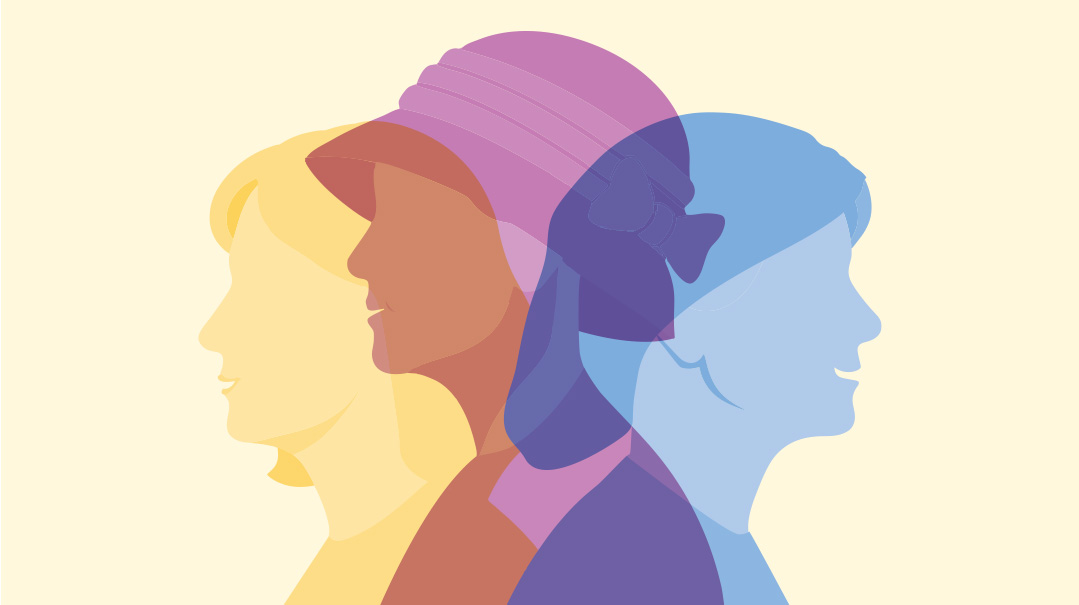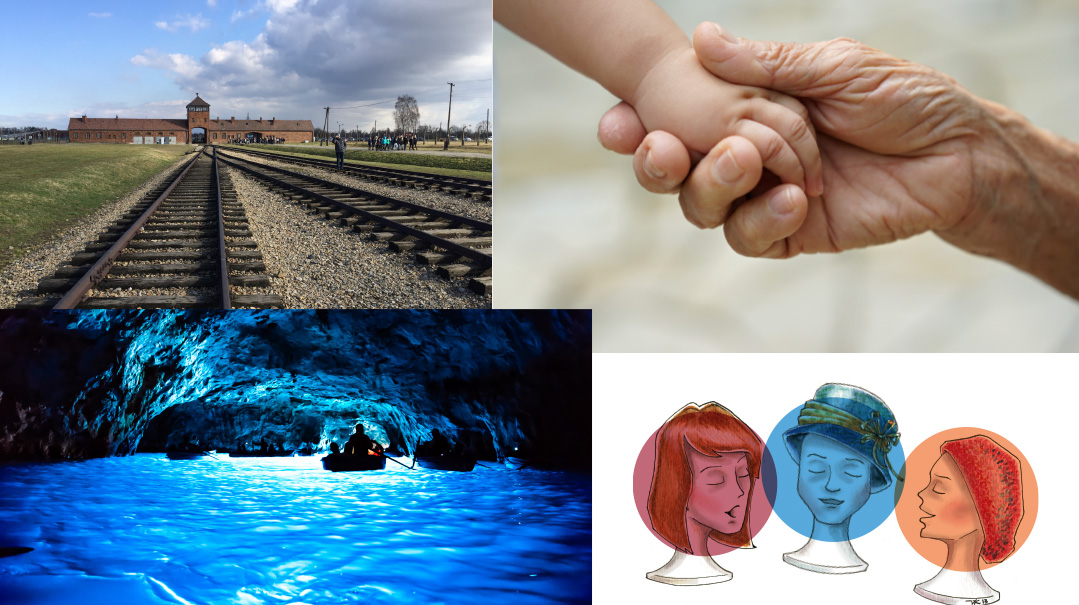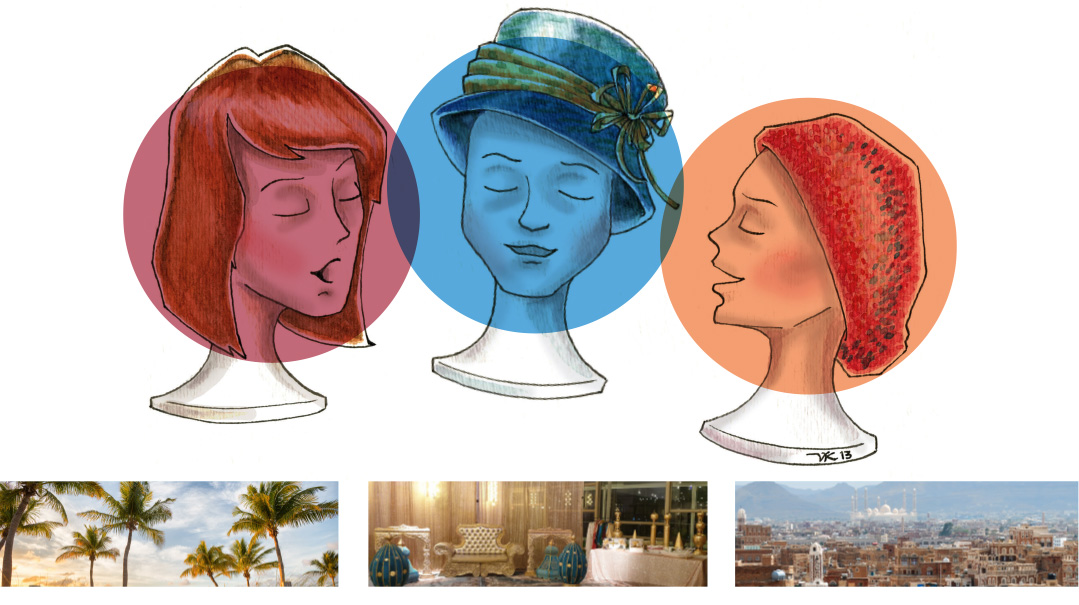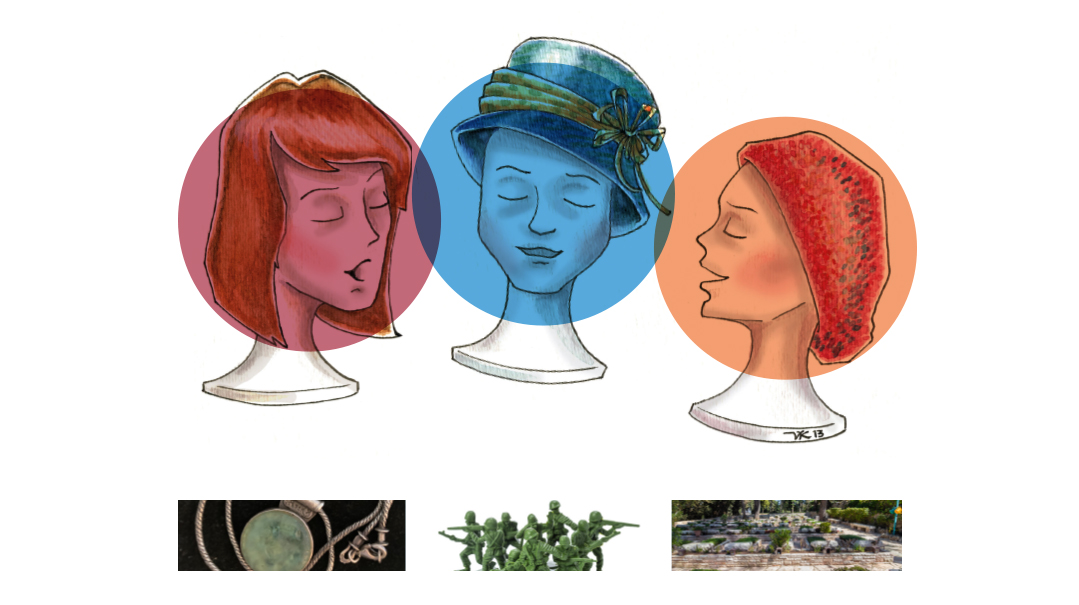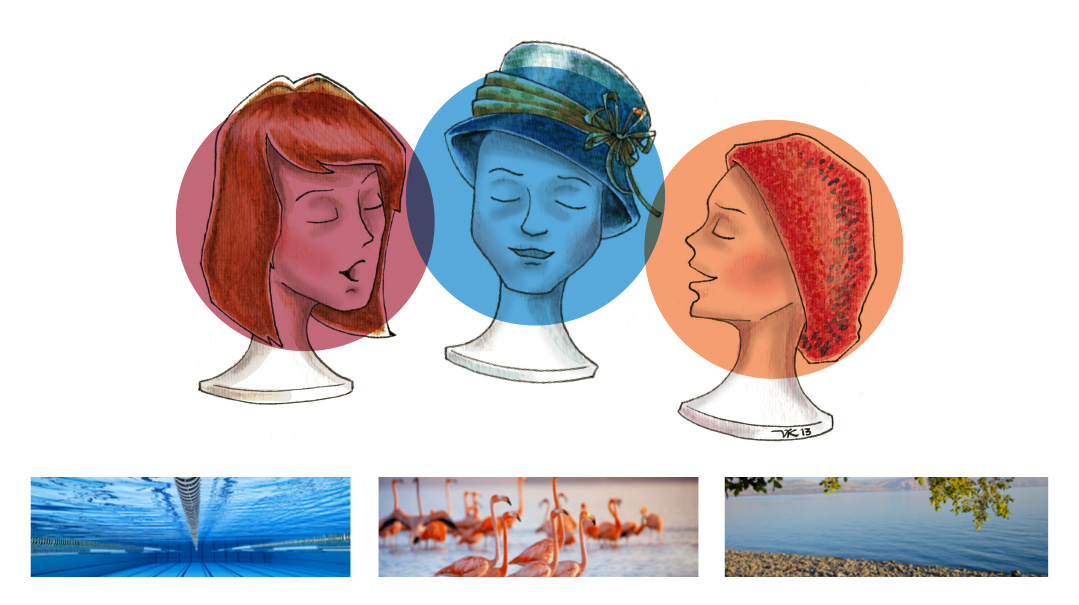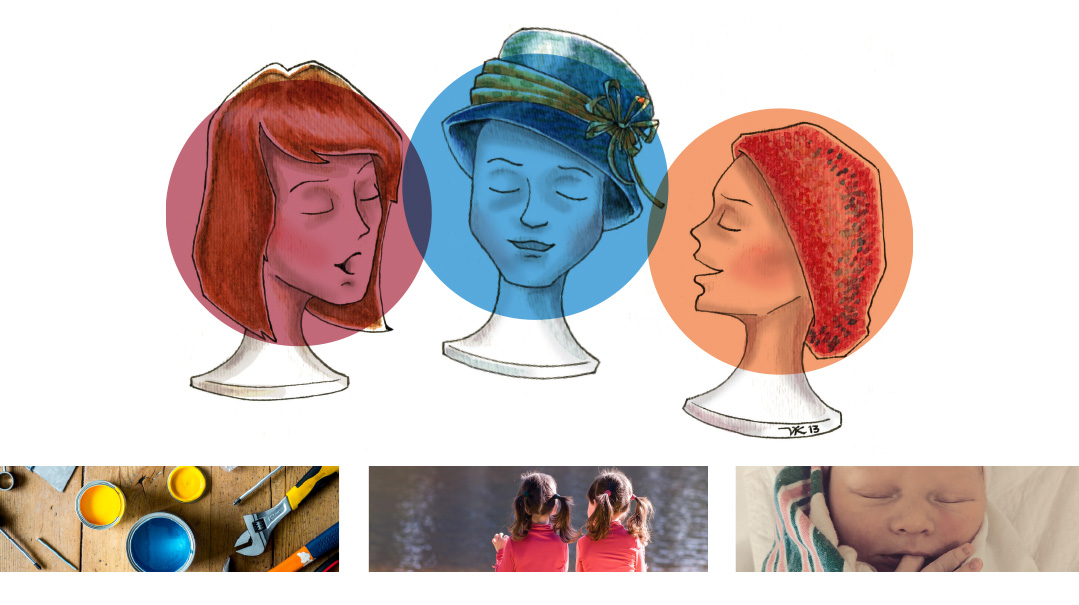In the Zone
| August 20, 2024We move out of our comfort zone, bemoan no-parking zones, and drive in a family no-fly zone
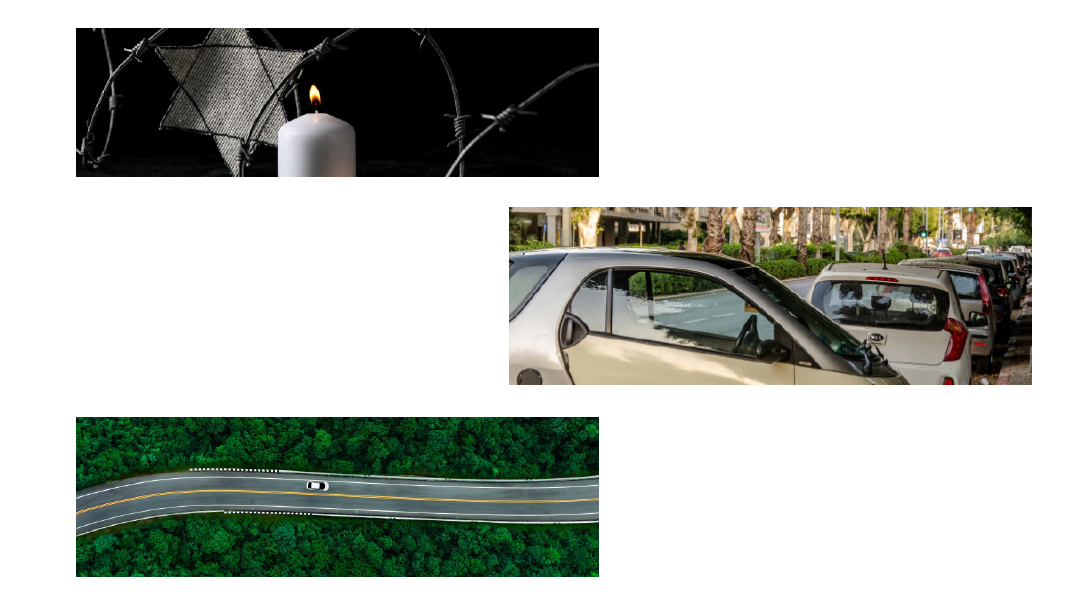
Being in different time zones makes it challenging for us three sisters to schedule brainstorming Zooms (SchmooZooms) to choose a topic we all agree on. When we finally do Zoom, we follow a simple rule: If any topic works for only two of us, then it goes into a file of Unwritten Schmoozes for possible future resuscitation.
Another guiding principle: If we ever head toward something like conflict (baruch Hashem, that hasn’t happened yet!), we remember our parents, Nachum and Rose Stark a”h. That’s when we take a step back.
During our latest SchmooZoom, as ideas flew across video cyberspace, we came up with a topic that worked for us all: Zones.
We hope you won’t zone out as we move out of our comfort zone, bemoan no-parking zones, and drive in a family no-fly zone.
Emmy Leah moves...
Out of Her Comfort Zone
Zikaron b’Salon — Remembrance in the Living Room — is an Israeli program where Shoah survivors, and more recently, their children, share their or their parents’ stories to a group gathered in a home setting.
Our mother, Mrs. Rose Stark a”h, survived Auschwitz. For years, she told her own story, in speech and writing, about the nightmare night when her young husband, baby, parents, in-laws, three sisters, and their families were murdered. About her year of torture, slave labor, and death marches; her recovery in Sweden; rebuilding her family in America. With her gift for language (she spoke eight!), she moved audiences and readers.
Since her petirah, I’ve spoken and written about her experiences. So when Zikaron b’Salon asked me to speak, I felt… comfortable.
I’d speak in my hometown, Bet Shemesh, and in English. It’s never easy to discuss the Shoah, but I was still comfortably in my comfort zone: speaking in my native language to religious English-speaking women, sitting on a comfortable couch, perhaps with comfort foods (burekas? cheesecake?) after my talk. Focusing on my mother’s strength and resilience, the evening would be… comforting.
And then came the phone call, and comfort took an uncomfortable turn…
*
A social worker asked me to speak about my mother’s Holocaust experience.
In Hebrew, not English.
At a rehabilitation facility, not in a living room.
Not to religious women, but to non-religious men, recovering drug and alcohol addicts completing a year of therapy.
Discomfort doesn’t begin to describe my feelings. Stunned would be more like it.
Wanting to refuse, I explained that my Hebrew was fine for everyday use, but I still made mistakes.
“That’s good,” she answered. “These men need to learn it’s okay to make mistakes and to continue anyway.”
Suddenly my difficulties with zachar and nekeivah (grammatical masculine and feminine) could become a source of inspiration. Hmmm….
I shared some of my mother’s stories of before, during, after the Holocaust, describing how she rebuilt a shattered life.
That’s exactly what these men have to hear, she said.
Comfort zone?
Overrated.
I agreed to speak.
*
The rehab campus was lovely, full of flowering gardens. I entered a room to meet my audience: tough-looking middle-aged men sporting tattoos, earrings, and shaved heads. If I met one of them on a dark street, I’d run the other way.
But I remembered what my mother often said. She’d describe fights among different Jewish groups in prewar Munkacs. “And then came Hitler, yemach shemo, and reminded us that we’re all Jews.”
Jews. Jewish men who had been in dark places and were trying to rebuild their lives.
Like my mother did.
*
I spoke to the group for over an hour. If I groped for a Hebrew word, one of them helped me out. Nobody seemed upset if I mixed up zachar and nekeivah.
I focused on stories they could relate to. After Auschwitz, my mother said, there were moments when she was angry with Hashem, so to speak. But, she would always add, she never stopped talking to Him. While she could never forget or explain her losses, she learned to accept them as Hashem’s will.
Perhaps some of these men could do that, too.
I described her nightmares after Auschwitz — and how they stopped when her daughter Marcia was born. And I described how she saw Hashem’s Hand in the birth of her twins (Miriam and me). In Sweden, she’d worked for a family where twins were born. Her first thought: I lost my one baby, and this woman has two. But then, she would tell us, she stopped herself. This Swedish woman didn’t murder my son, she thought. She told us she chose not to go down the path of anger, hatred, bitterness. She’d fargin the woman her twins. And, she’d finish the story, perhaps her own twins were a reward for that choice.
Would some of these men be inspired by a woman who chose the path of acceptance, not bitterness?
*
I finished speaking, answered questions, accepted their thanks. Leaving, I realized I’d forgotten the story I’d planned to end with: the moment on the ship heading towards the US, when my mother stood on deck and said, Hashem, I’m throwing my tears into Your ocean. With Your help I will start a new life.
My mistake. But that’s okay; it’s okay to make mistakes.
And to fix them…
… when b’ezras Hashem I’ll speak there again.
Miriam bemoans…
The No-Parking Zone
IFyou identify with this statement, raise your hand:
My life is defined by three elements. Hashgachah pratis. My choices between evil and good. And finding a parking space.
Kidding.
A little.
*
Lame jokes aside, parking really is serious business. I mean, for us car drivers, finding a parking space creates the boundaries of our lives
Mazel tov! My cousin Suri, after a decade of shidduch-searching, is engaged! My first question is not about the chassan, it’s, “Is there parking near the hall for the vort?” Ditto for grand-opening sales of a designer dress shop (do they have a parking lot?) and life-changing shiurim of a beloved rebbetzin (I’m not going anymore; last time I spent half an hour looking for a spot, and finally drove home — where a neighbor’s son had blocked my parking spot).
We know that we grow from our challenges and struggles, so just give me a minute (or 20) while I try to get my 182.7-inch long Nissan Sentra into a 182.6-inch long parking space, and then we’ll start exploring some life lessons I’ve learned from Yerushalayim’s perpetual parking shortage.
*
First, a bit of personal history. Even when I was a new driver, in the grand old days of larger spaces and fewer cars, my parking skills were, to put it kindly, um… lacking. I can remember many times when my non-Jewish neighbors watched me again and again try not to hit the curb, try not to hit the tree on the curb, and try not to hit the fire hydrant next to the tree on the curb.
“Get out of the car,” they would say gruffly. “I’ll park it for ya.”
It may be genetic. My nephew remembers how years ago, as a soldier in the IDF, he proudly displayed his “rishayon l’nehigat tahnk” — that is, his tank driver’s license. And then, with a wry laugh, he admitted that while he had the government’s permission to drive a tank, he hadn’t yet passed his driving test and gotten a license. Why? “You can park a tank anywhere you want.” (Shout-out to our brave soldiers, Hashem should watch over all of them.)
*
Back to our life lessons. Let’s start with generosity of spirit. There’s a common phrase, “getting out of a tight spot,” and in the case of my sister Emmy Leah and our good friend Chavi, the tight spot was literal. The challenge, though, was not getting out, it was getting in: a parking space in Geulah on Erev Shabbos. After Emmy Leah, who shares my parking disabilities, tried for ten minutes to get into that rare spot, Chavi gently offered to do it for her, and soon, without damaging curbs, cars, or people, the minivan was happily parked. And Chavi did it without rolling her eyes or making fun. Thanks, Chav.
And here’s an epic parking failure, with a major life lesson. It was Chol Hamoed Succos, perfect weather for a hike. My husband made the usual left turn onto the hiking trail, to get to where we usually parked the car. Only, no one had mentioned that some government authority had dug a roadside ditch to keep cars off the dirt road.
Boom! And our car was beautifully parked on the side of the road, with three tires stuck in a pit.
There was no Yedidim (the Israeli version of Chaverim) in those benighted times, a tow truck would take hours, and there was no way we could reverse out of there. Help!
Three minutes later, a car stopped. And then a van. And then another car. Three men jumped out — one sporting tattoos, one wearing a knitted kippah, and one with a big black velvet yarmulke perched on his head. Van Man took out a chain from the back and attached it to his fender, Black Yarmulke hooked it to the bottom of our car, and Knitted Kippah helped guide Van Man as he slowly schlepped us out of our deep and nasty parking space.
Truly an unforgettable life lesson in mi k’amcha Yisrael….
*
But for the best response to the Yerushalayim parking crisis, I will, as I so often do, turn to our mother, Rose Stark a”h. I’d be stuck in still another traffic jam or eyeing a completely full parking lot with frustration bordering on despair. Mommy, sitting next to me, would look out her window and say, “Keek Hitler — an uremah landt. [Look, Hitler, an impoverished land.]” Her dark eyes would take on that special glow of a survivor’s eyes gazing upon the rebirth of the Jewish nation, a glow of profound gratitude.
So many cars.
So many Jews driving those cars.
So what if there aren’t enough parking spaces? I’ll just drive around the block again.
And thank Hashem.
Marcia enjoys road trips because they’re…
In the No-Fly Zone
There’s something about a family road trip. On a plane, you’re stuck for hours among strangers. But in a car, you can sing as loud as you like, play music without headphones, and make a road stop whenever the noise level reaches intolerable decibels. You’re not embarrassed when your kids kvetch, whine, and bicker.
When you’re in the no-fly road trip zone, you can play time-killing games like Geography (N? Netherlands. S? Sweden. N? New York. K? Kanada. “No, tattehleh, that starts with a C.”). Or Initials (MM. Male? Yes. Alive? No. Dead? No. Fictional? Yes. Oooh, I know — Mickey Mouse!).
And then there are SUPER road trips. Multi-car, multistate, multifamily, multigenerational road trips. Road trips on steroids.
*
On one Sunday every summer you’ll find five, six, sometimes seven cars tooling along the Eastern Seaboard. They come from Connecticut, Florida, Maryland, New York, and even Nevada (the Las Vegans first fly east, then rent a car). All headed for…
… the annual Meth family reunion vacation. Code name: Duck.
Duck, a town in the North Carolina Outer Banks (OBX), was the site of our first annual reunion 16 years ago. Over the years, we’ve rented beachside McMansions in Duck and other OBX towns. Once we even ventured down into North Myrtle Beach, South Carolina. Still Duck.
But the fun and bonding start way before we reach our destination. It’s all about the anticipation — amplified by the texts and photos that explode the Meth Family Chat while we’re on the road:
Hey Florida, where r u guys?
Left right after Shabbos, drove thru the nite. About to stop at South-of-the-Border for Shacharis and a picnic breakfast. Where r u holding?
About half an hour behind the other Silver Spring car. Just crossed into Virginia.
It’s also about helping each other. Like getting traffic advice from up ahead:
Newport News area traffic really backed up. You might need to check Maps for a bypass.
*
Last year, my son-in-law Josh drove an All Boys Car (ABC) that included three boy cousins. My daughter Leah and I drove an All Girls Car (AGC?) with two Raizel cousins in the back seat. Ours turned into an eventful trip….
Raizel K was carsick. But no worries, we had a bucket. They’re chattering again. We’re gonna pull into a Flying J to clean her up.
Further down the road, Leah and I ran into more serious trouble — a blowout on I-95 somewhere between Virginia and North Carolina. Thankfully, we were able to hobble the car safely onto the wide grassy median between the northbound and southbound lanes. As soon as we posted our predicament on the family chat, those ahead of us offered to turn back to help.
We made light of the situation and texted back: No need. AAA promised to send someone — as soon as they figure out which state we’re in LOL! Don’t worry, the Raizels are playing nicely, and we’ve got plenty of drinks, nosh, and toys.
OK, in that case we’re gonna make a shop stop at the Williamsburg outlets.
Two long hot hours later… we were back on the road.
Our anticipation mounted as the cars up ahead sent photos of familiar landmarks — like the dozen or so painted wooden signs leading to a famous North Carolina orchard. Signs with promises of “Watermelon,” “Peaches,” “Fireworks,” “Fudge,” and more.
As usual, the Floridians were first to arrive.
We’re here! The place is GORGEOUS!
OK you guys, don’t hog the best bedroom just because you’re first.
Don’t worry, Bubby gets the best bedroom. Besides, after 17 hours on the road, who cares about bedrooms. We just want to jump into the pool.
Finally, the last car — ours — pulled into the massive McMansion parking lot. Lots of hugging, kissing, back-slapping (the boys), jumping (the girls), crying (me). Shlepping luggage up the stairs. Kashering the kitchen. Unpacking ice chests. Shopping for more provisions.
The start of a fun-filled week of sibling catch-up, cousin bonding, and intergenerational love.
Just one regret… If only we could do a road trip to our family in Israel.
L’shanah haba’ah b’Yerushalayim!
(Originally featured in Family First, Issue 907)
Oops! We could not locate your form.

